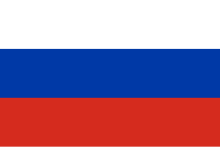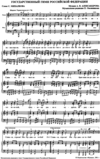National anthem of Russia

The Hymn of the Russian Federation (Государственный гимн Российской Федерации, Gosudarstvenny Gimn Rossiyskoy Federatsii) is the national anthem of Russia. The music of the anthem, composed by Alexander Alexandrov, was used for the Soviet anthem but with revised lyrics written by Sergey Mikhalkov. It was adopted in late 2000 by President Vladimir Putin and replaced the former anthem, The Patriotic Song. Before and after the adoption of the anthem, liberal groups raised concerns that the re-adoption of the Soviet anthem is returning Russia to the Soviet era. The revised lyrics remove mention of Lenin's ideas and the "unbreakable union" of the Soviet state, instead speaking of a country that is vast in distance and in resources that will be entrusted into future generations.
History (until 1944)
Before the adoption of Molitva russkikh (The Prayer of the Russians) was chosen to be the national anthem of Imperial Russia, various church hymns and military marches were used to honor the country and the state leader, then the Czar. Molitva russkikh was adopted around 1815, which used lyrics by Vasily Zhukovsky set to the music of the British anthem, God Save the Queen. [1] In 1833, Zhukovsky was asked again to write lyrics to a musical composition by Alexis Lvov called The Russian People's Prayer. It was well received by Nicholas I and chose the song, known more commonly as God Save the Czar, to be the next anthem. The reasons for its' selection was that the song sounded very close to a religious hymn and its' musical style is closely similar to the other anthems used by European monarchs. God Save the Tsar was used until the 1917 October Revolution, when the Russian monarchy was overthrown by Lenin and his Bolshevik army. [2]
Upon the removal of the Czar and his family, two songs were used by the Bolsheviks as unofficial hmyns from 1917 until 1918. The first song, Worker’s Marseillaise, was a modification of the French anthem La Marseillaise by Petr Lavrov. Created in 1875, its use as an them was shortlived. The second anthem, the Internationale, was also created by French nationals; Pierre Degeyter (music) and Eugène Pottier (music). Translated into Russian by Arkadiy Yakovlevich Kots in 1902, the song was used as the anthem of the newly created Union of Soviet Socialist Republics from 1918 until 1944.[1]
Music
The music of the national anthem, created by Alexandrov, has been used in several hymns and compositions before its use in the Russian anthem. The first time the music was used was in the Hymn of the Bolshevik Party, created in 1938. The music was chosen again as the National Anthem of the Soviet Union in 1944 by the Soviet leader Joseph Stalin. However, even before it was chosen as the Bolshevik hymn, Alexandrov used similar music in the song Zhit stalo luchche (Life has become better).
During the 2000 anthem debate, it was discussed in the newspaper Lenta.ru that the music Alexandrov created for the Soviet hymn was similar to Vasily Kalinnikov 1892 overture Bylina.[3] The supporters of the Soviet anthem used this fact in the various debates that took place in the Duma about the anthem change.[4] There is no evidence that Alexandrov borrowed or used parts of Bylina in his compositions either intentionally or coincidently.
Lyrics
Mikhalkov was asked by Stalin to write lyrics for the new Soviet hymn around the same time the music was being composed. In 1943, Mikhalkov and Georgian poet Gabriel El-Registan completed the task of writing the lyrics, which were approved a year later. Upon the death of Stalin in 1953, the lyrics composed by Mikhalov and El-Registan were discarded during the process of destalinization by the government. Mikhalkov was asked to write the lyrics for the Soviet anthem again in 1977 in order to replace any mention of Stalin. Along with other small changes, these lyrics began to be used in 1977 and used until the fall of the Soviet Union in 1991.
When it was clear that the Soviet anthem was going to be re-adopted in 2000, the Kremlin and President Putin started a national contest to find lyrics for Alexandrov's music. Yielding about 6,000 entries, the winner that was chosen was penned by Mikhalkov. [2] Before the official adoption of the anthem, the Kremlin released a section of the anthem, which made a reference to the flag and arms:
- Its mighty wings spread above us
- The Russian eagle is hovering high
- The Fatherland’s tricolor symbol
- Is leading Russia’s peoples to victory[5]
When the final changes to the lyrics were being made in December of 2005, the above section was not included. The new lyrics refer to the Russian homeland, spacious and grand, that is being entrusted to all generations by God. This is complete change from the Soviet anthem lyrics, which speaks highly of Lenin, communism, and pledges a "union of freeborn republics" will stand forever, united.
Adoption
Before 2000, there were efforts to refine The Patriotic Song, the Russian anthem adopted in 1991 by then-president Boris Yeltsin after the collapse of the Soviet Union. The main problem with the anthem, composed by Mikhail Glinka, was that it did not have any lyrics. Various attempts were made to compose lyrics for the anthem, including the 1990 composition of Viktor Radugin's Be glorious, Russia (Славься, Россия! ("Slav'sja, Rossija!), but none were adopted by Yeltsin.
The anthem debate picked up momentum in October of 2000 when Yeltsin's successor Vladimir Putin made a comment that Russian athletes were silent when the Patriotic Song was playing during the gold medal ceremonies at the 2000 Summer Olympic Games.[6] CNN also reported that players of the football club Spartak Moscow complained that the wordless anthem "affected their morale and performance".[7] Putin pressed for the former Soviet anthem to be selected as the new Russian anthem, but strongly suggested that new lyrics were to be written. The Duma voted 371-51-1 on December 8, 2000 to adopt the Soviet anthem and the new lyrics, written by Mikhalkov.[8] Being signed into law by President Putin on December 20, the new anthem was first used officially on December 30 during a ceremony at the Great Kremlin Palace in Moscow.[9]
Not everyone agreed with the adoption— Yeltsin said that Putin should not have changed the anthem merely to "blindly follow the mood of the people". The liberal political party Yabloko stated that the re-adoption of the Soviet anthem "deepened the schism in [Russian] society".[10] The re-adoption of the Soviet anthem was supported by the Communist Party and by Putin himself. Those who opposed the Alexandrov music attempted to not only keep the Patriotic Song, but also to have the Duma to vote on the Czarist anthem, God Save the Czar (Bozhe Carja hrani).
Regulations
While it is the choice of the performer to execute the anthem using only music, only words or a combination of both, it must be performed using the official lyrics and music provided in the law. After the performance is recorded, it can be used for any purpose, such as a radio or television broadcast. The anthem can be played during solemn or celebratory occasions, but it is required to be played at the swearing-in of the President of Russia, opening and closing sessions of the Duma and the Federation Council, and official state ceremonies. The anthem is also played on television and radio before the start and closing of programming or if the programming is continuous, the anthem is played at 2400 and 0600 hours. The anthem is also played at sporting events in and outside of Russia, but only according to the protocol of the organization that is hosting the games. When the anthem is played, all headgear must be removed and people must face the Russian flag, if it is present. Those who are in uniform must give a military salute when the anthem plays. Pieces of the national anthem can be used in other works, as long as the Russian President has granted permission. Those who perform the anthem in a way that could cause offense and disrespect can be punished in accordance with the law.[11]
On one occasion, Putin chewed out the national soccer team in the summer of 2004 about the team's behavior during the playing of the anthem. Before the start of tournament matches in the 2004 European Football Championship tournament, the team was caught on camera consuming gum during the playing of the Russian anthem. Putin, using Leonid Tyagachyov, the head of the Russian Olympic Committee as his messenger, told the team to quit using gum and sign the anthem. This message was delivered after the Russian team lost to Spain during the tournament.[12]
Official lyrics
| Russian | Transliteration | Literal translation |
|---|---|---|
| Россия — священная наша держава, Россия — любимая наша страна.
От южных морей до полярного края
Широкий простор для мечты и для жизни
|
Rossiya — svyashchennaya nasha derzhava,
Ot yuzhnykh morey do polyarnogo kraya
Shirokiy prostor dlya mechty i dlya zhizni.
|
Russia - our sacred state,
From the southern seas to the polar realm
Wide spaces for dreams and for life
|
Media

Template:Multi-listen start Template:Multi-listen item Template:Multi-listen item Template:Multi-listen item Template:Multi-listen item Template:Multi-listen end
References
- ^ a b Russian Anthems Museum. Retrieved Apr. 03, 2006.
- ^ a b RussiaInfo Guide to Russia - National Anthem. Retrieved Apr. 03, 2006.
- ^ Template:Ru icon "Гимн СССР написан в XIX веке Василием Калинниковым и Робертом Шуманом". Lenta.ru. 2000-12-08.
{{cite news}}: Check date values in:|date=(help) - ^ Template:Ru icon Выступление Б. Грызлова при обсуждении законопроекта о государственной символике Российской Федерации
- ^ Flags of the World reporting about flag-related proposed lyrics
- ^ Christianity Today - Putin complains about the lack of lyrics to the anthem in October 2000
- ^ CNN Reporting the Duma's Adoption of Alexandrov's anthem in December of 2000
- ^ People's Daily - Russian Duma Approves National Anthem Bill. Dec. 8, 2000. Retrieved Apr. 3, 2006.
- ^ President of Russia State Insignia - National Anthem. Retrieved Mar. 30, 2006.
- ^ BBC Reporting the Duma's Adoption of Alexandrov's anthem in December of 2000
- ^ Template:Ru icon Law on the Russian anthem
- ^ The Moscow Times Putin Tells Soccer Team: Sing Russian Anthem, Don't Chew. July 29, 2004. Retrieved Mar. 30, 2006.
External links
- Template:Ru icon Government of Russia's website on the national symbols
- President of Russia State Insignia - National Anthem, Brief page in English
- Template:Ru icon Federal Constitutional Law on the National Hymn of the Russian Federation
- Other recordings of the anthem, an extensive collection
